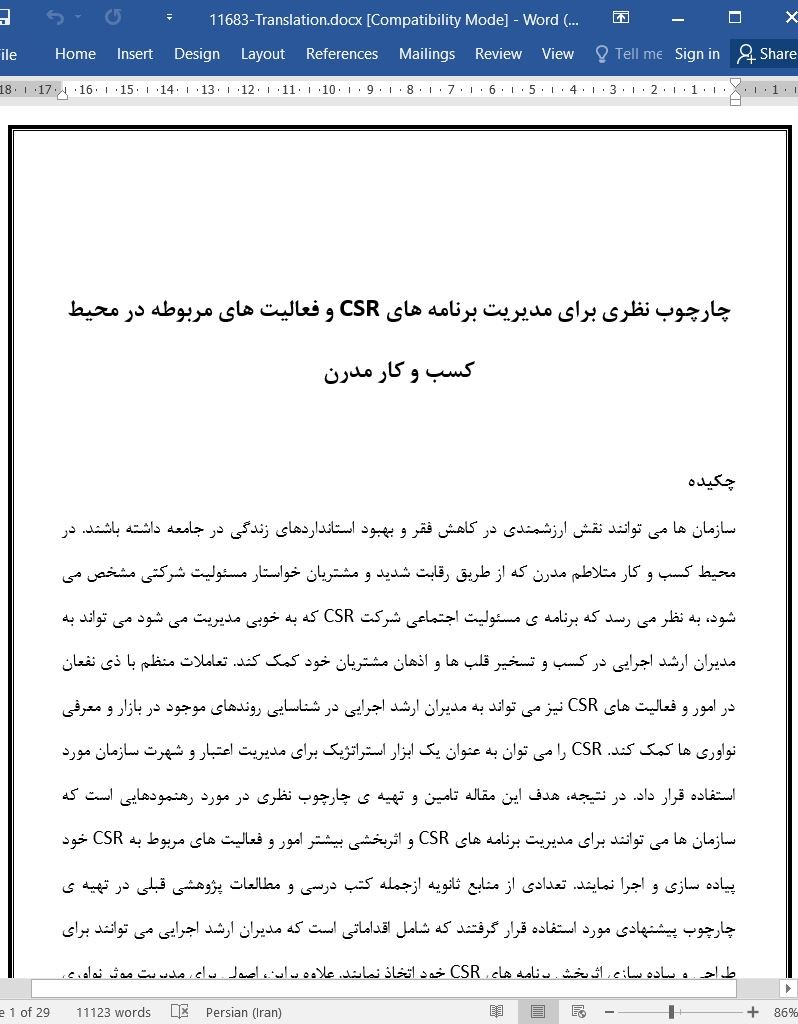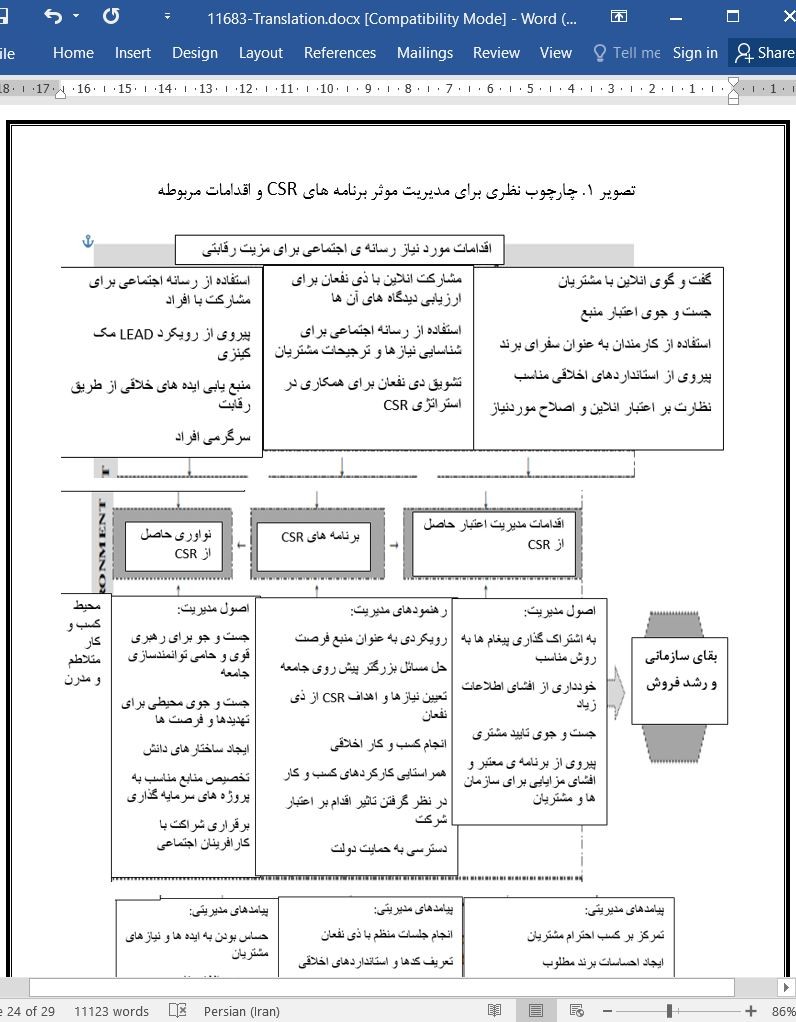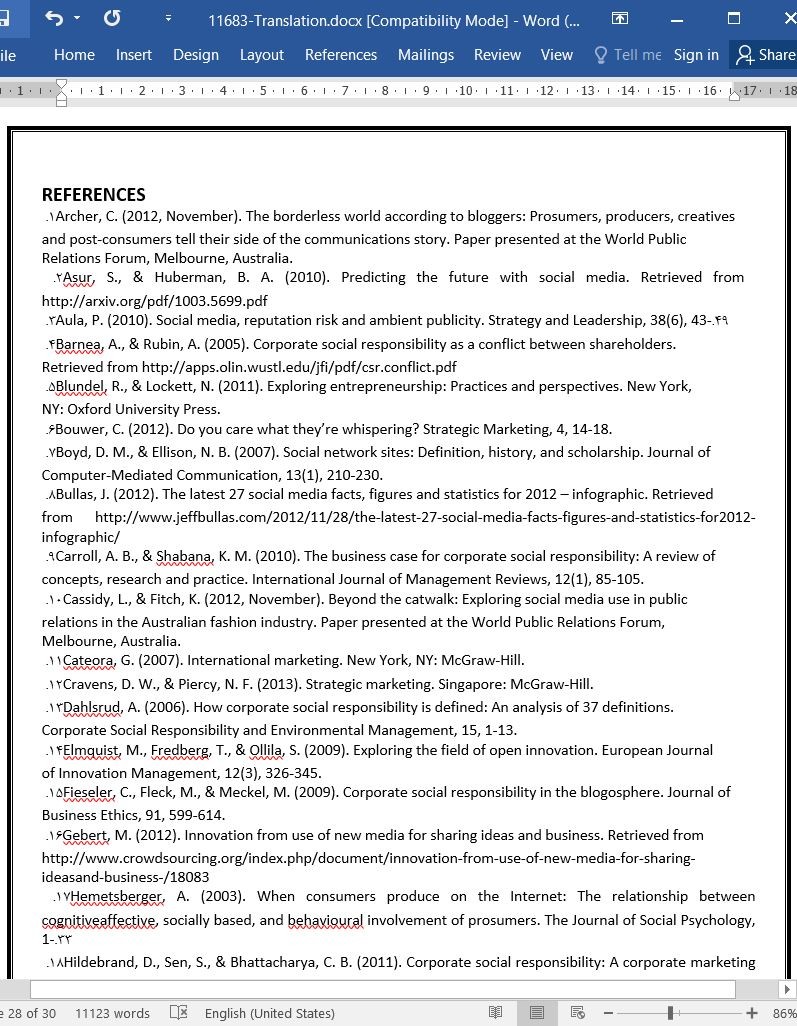
چارچوب نظری برای مدیریت برنامه های CSR و فعالیت های مربوطه در محیط کسب و کار مدرن
چکیده
سازمان ها می توانند نقش ارزشمندی در کاهش فقر و بهبود استانداردهای زندگی در جامعه داشته باشند. در محیط کسب و کار متلاطم مدرن که از طریق رقابت شدید و مشتریان خواستار مسئولیت شرکتی مشخص می شود، به نظر می رسد که برنامه ی مسئولیت اجتماعی شرکت CSR که به خوبی مدیریت می شود می تواند به مدیران ارشد اجرایی در کسب و تسخیر قلب ها و اذهان مشتریان خود کمک کند. تعاملات منظم با ذی نفعان در امور و فعالیت های CSR نیز می تواند به مدیران ارشد اجرایی در شناسایی روندهای موجود در بازار و معرفی نواوری ها کمک کند. CSR را می توان به عنوان یک ابزار استراتژیک برای مدیریت اعتبار و شهرت سازمان مورد استفاده قرار داد. در نتیجه، هدف این مقاله تامین و تهیه ی چارچوب نظری در مورد رهنمودهایی است که سازمان ها می توانند برای مدیریت برنامه های CSR و اثربخشی بیشتر امور و فعالیت های مربوط به CSR خود پیاده سازی و اجرا نمایند. تعدادی از منابع ثانویه ازجمله کتب درسی و مطالعات پژوهشی قبلی در تهیه ی چارچوب پیشنهادی مورد استفاده قرار گرفتند که شامل اقداماتی است که مدیران ارشد اجرایی می توانند برای طراحی و پیاده سازی اثربخش برنامه های CSR خود اتخاذ نمایند. علاوه براین، اصولی برای مدیریت موثر نواوری های حاصل از CSR و اقدامات و فعالیت های مدیریت اعتبار نیز ارائه می شود. این چارچوب بر رهنمودهایی برای انواع اقدامات و فعالیت های رسانه ی اجتماعی تمرکز می کند که باید در برنامه ی استراتژیک مدیر ارشد اجرایی، ترکیب شوند تا اطمینان حاصل شود که استراتژی پیاده سازی شده کاملا رقابتی است. این مقاله با تعدادی از پیشنهادات و توصیه ها، نتیجه گیری خود را بیان می کند که می توانند در مطالعه ی تجربی آینده مورد بررسی قرار گیرند و کمک بیشتری را برای سازمان ها فراهم سازند تا کسب و کار خود را در محیط کسب و کار متلاطم و مدرن امروزی حفظ نموده و ارتقا دهند. این مقاله به مدیران اجرایی مربوط می شود که نیازمند رهنمودهایی در مورد پیاده سازی موفقیت آمیز اقدامات CSR خود هستند و در بهبود رفتار سازمانی در محیط مسئولیت اجتماعی نقش دارند.
1. مقدمه و سابقه
درعصر مدرن، که در آن مرزهای بازار و صنعت را نمی توان به راحتی تعریف کرد، مدیران ارشد اجرایی با بسیاری از مسائل پیچیده و چالش برانگیز مواجه هستند. اشکال جدید و مخربی از رقابت در حال ظهور و پیدایش است، مشتریان بینش و تقاضای بیشتری دارند، بسیاری از افراد از جمله ی فعالانی هستند که فشار زیادی را بر سازمان ها وارد می کنند تا استانداردهای اخلاقی بالایی را دنبال کرده و از مسئولیت شرکتی خود محافظت نمایند. در این محیط کسب و کار آشفته و متلاطم، مدیران ارشد اجرایی راهی جز بررسی منابع جدید مزیت رقابتی ندارند (کراونس و پیرسی 2013).
6. نتیجه گیری و پیشنهادات
در هزاره ی جدید، تشدید رقابت، تقاضای بیشتر مشتریان و چالش های رسانه ی اجتماعی، فشارهایی را برای عملکرد و بقای سازمان ایجاد کرده اند. مدیران ارشد اجرایی راهی جز یافتن مسیرهای جدید برای کسب مزیت رقابتی و رشد کسب و کار خود در بلندمدت ندارند.
سازمان ها می توانند بر اقدامات CSR به عنوان نقطه اغازی برای کمک به خود در کسب مزیت رقابتی تمرکز نمایند. تعاملات منظم با مشتریان به مدیران اجرایی کمک می کند تا اقدامات نواوری اجتماعی شرکتی جدید را که می تواند برای جامعه سودمند باشد، شناسایی نمایند. ارتباطات موثر برنامه های CSR نیز به سازمان ها در ایجاد اعتبار مثبت و متقاعد ساختن مشتریان کمک می کند.
ABSTRACT
Organisations can make a valuable contribution in alleviating poverty and improving the general living standards of society. In the modern turbulent business environment, characterised by intense competition and customers demanding corporate responsibility, it further seems that a well-managed corporate social responsibility (CSR) plan could assist executives in winning the hearts and minds of their customers. Regular interactions with stakeholders on CSR initiatives can also assist executives in identifying trends in the market and introducing innovations. CSR can further be used as a strategic tool to manage the reputation of the organisation. Consequently, the purpose of this paper is to provide a theoretical framework on guidelines that organisations could implement to manage their CSR plans and CSR-related initiatives more effectively. A number of secondary sources, including textbooks and previous research studies, were consulted in compiling the proposed framework which includes actions that executives could take to design and implement their CSR plans more effectively. In addition, principles for the effective management of CSR-driven innovations and reputation management initiatives are also provided. The framework also focuses on guidelines for the types of social media initiatives that would need to be incorporated into the executive’s strategic plan to ensure that the strategy implemented is truly competitive. The paper concludes with a number of recommendations that could be further investigated in a follow-on empirical study to provide further assistance to organisations wishing to survive and grow their businesses in the modern turbulent business environment. The paper is relevant to executives requiring guidance on implementing their CSR initiatives more successfully and contributes to the improvement of organisational behaviour within the socially responsible environment.
1. INTRODUCTION AND BACKGROUND
In the modern era, in which market and industry boundaries can no longer be easily defined, executives are confronted with many complex and challenging problems. New and disruptive forms of competition are emerging, customers have greater insight and demands, and many individuals have become activists placing pressure on organisations to follow high ethical standards and take care of their corporate responsibility. In this turbulent business environment executives are left with no alternative but to investigate new sources of competitive advantage (Cravens & Piercy, 2013, p. 227).
6. CONCLUSIONS AND RECOMMENDATIONS
In the new connected millennium, the intensification of competition, greater demands from customers, and social media challenges have created pressure for organisations to perform and survive. Executives are left with no alternative choice but to find new avenues to gain a competitive advantage and grow their businesses over the long term.
Organisations could focus on CSR initiatives as a starting point to assist them in obtaining a competitive advantage. Regular interactions with customers would then further aid executives in identifying new corporate social innovation initiatives that could benefit society. The effective communication of CSR plans might also help organisations in building a positive reputation and persuade customers that they are truly caring about the world.
چکیده
1. مقدمه و سابقه
2. هدف
3. متدولوژی
4. مرورری بر ادبیات
4.1 مفهوم رسانه ی اجتماعی
4.2 مسئولیت اجتماعی شرکت
4.3 نوآوری
4.4 مدیریت اعتبار شرکت
5. یافته ها
5.1 مشاهدات و پیامدهای مدیریتی
5.2 چارچوب نظری
6. نتیجه گیری و پیشنهادات
منابع
ABSTRACT
1. INTRODUCTION AND BACKGROUND
2. PURPOSE
3. METHODOLOGY
4. LITERATURE REVIEW
4.1 The Social Media Concept
4.2 Corporate Social Responsibility
4.3 Innovation
4.4 Corporate Reputation Management
5. FINDINGS
5.1 Observations and Managerial Implications
5.2 Theoretical Framework
6. CONCLUSIONS AND RECOMMENDATIONS
REFERENCES
- اصل مقاله انگلیسی با فرمت ورد (word) با قابلیت ویرایش
- ترجمه فارسی مقاله با فرمت ورد (word) با قابلیت ویرایش، بدون آرم سایت ای ترجمه
- ترجمه فارسی مقاله با فرمت pdf، بدون آرم سایت ای ترجمه



